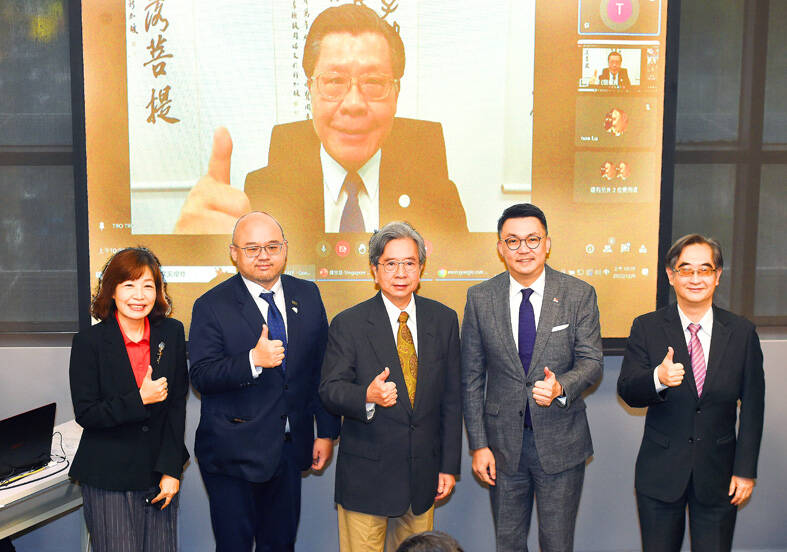Taiwan ranked third-best among Singapore’s most important foreign investors, and Taiwanese entrepreneurs ranked second-best among foreign businesspeople there, a survey on Singaporean perceptions of the nation showed.
Taiwanese Representative to Singapore Francis Liang (梁國新), Singaporean Trade Representative to Taipei Yip Wei Kiat (葉偉傑) and Taiwan-Asia Exchange Foundation (TAEF) Chairman Michael Hsiao (蕭新煌) were among those who yesterday commented on the survey at a news conference in Taipei.
The survey was conducted as part of a project to study Taiwan and Taiwanese entrepreneurs’ image in countries included in the New Southbound Policy, the TAEF said.

Photo: Liao Chen-hui, Taipei Times
More than 80 percent of Singaporean entrepreneurs agreed that Taiwan has a positive image, the poll showed.
The nation also scored highly on a range of qualities, including friendliness, cultural diversity and technology.
Taiwan had the highest approval rating after Japan and Switzerland among Singapore’s 15 direct foreign investors, while China was the sixth-most well-liked, it said.
More than 81 percent of respondents agreed that Taiwanese entrepreneurs have a good image in Singapore, and the group was considered trustworthy, innovative and law-abiding.
The nation’s businesses did not do as well in other categories, as only 68 percent of respondents agreed that entrepreneurs hailing from Taiwan treat employees well, while 63 percent agreed that the group is internationalized.
Overall, the image of Taiwanese entrepreneurs was second only to Japan, and trailed by the US and Switzerland, with China taking 10th spot in the rankings, it said.
The survey showed 93 percent of Singaporean businesses expressed willingness to do more business with their counterparts in Taiwan, including 80 percent in the tourism sector, 59 percent in semiconductors and 58 percent in smart electronics.
Additionally, 55 percent of businesses in the Web-based international retail sector and 53 percent of businesses in the information technology sector reported a willingness to do business with the nation.
Taiwan’s positive image in Singapore appears to be partially rooted in the nation’s soft power — including politeness, cultural diversity and cuisine — that are difficult to quantify, the TAEF wrote in its report, citing outside experts.
The survey also indicated that Taiwanese businesses are excessively hierarchical and employees lack English-language proficiency, it said.
Taiwan should strengthen its ties with Singapore, especially regarding the training and exchange of highly skilled workers, supply chain resilience and maintenance of regional peace, the TAEF said.
Disruptions to global supply chains stemming from the US-China trade dispute and Russia’s invasion of Ukraine have underlined the importance of cooperation in these fields, it added.

Taiwan has received more than US$70 million in royalties as of the end of last year from developing the F-16V jet as countries worldwide purchase or upgrade to this popular model, government and military officials said on Saturday. Taiwan funded the development of the F-16V jet and ended up the sole investor as other countries withdrew from the program. Now the F-16V is increasingly popular and countries must pay Taiwan a percentage in royalties when they purchase new F-16V aircraft or upgrade older F-16 models. The next five years are expected to be the peak for these royalties, with Taiwan potentially earning

STAY IN YOUR LANE: As the US and Israel attack Iran, the ministry has warned China not to overstep by including Taiwanese citizens in its evacuation orders The Ministry of Foreign Affairs (MOFA) yesterday rebuked a statement by China’s embassy in Israel that it would evacuate Taiwanese holders of Chinese travel documents from Israel amid the latter’s escalating conflict with Iran. Tensions have risen across the Middle East in the wake of US and Israeli airstrikes on Iran beginning Saturday. China subsequently issued an evacuation notice for its citizens. In a news release, the Chinese embassy in Israel said holders of “Taiwan compatriot permits (台胞證)” issued to Taiwanese nationals by Chinese authorities for travel to China — could register for evacuation to Egypt. In Taipei, the ministry yesterday said Taiwan

Taiwan is awaiting official notification from the US regarding the status of the Agreement on Reciprocal Trade (ART) after the US Supreme Court ruled US President Donald Trump's global tariffs unconstitutional. Speaking to reporters before a legislative hearing today, Premier Cho Jung-tai (卓榮泰) said that Taiwan's negotiation team remains focused on ensuring that the bilateral trade deal remains intact despite the legal challenge to Trump's tariff policy. "The US has pledged to notify its trade partners once the subsequent administrative and legal processes are finalized, and that certainly includes Taiwan," Cho said when asked about opposition parties’ doubts that the ART was

If China chose to invade Taiwan tomorrow, it would only have to sever three undersea fiber-optic cable clusters to cause a data blackout, Jason Hsu (許毓仁), a senior fellow at the Hudson Institute and former Chinese Nationalist Party (KMT) legislator, told a US security panel yesterday. In a Taiwan contingency, cable disruption would be one of the earliest preinvasion actions and the signal that escalation had begun, he said, adding that Taiwan’s current cable repair capabilities are insufficient. The US-China Economic and Security Review Commission (USCC) yesterday held a hearing on US-China Competition Under the Sea, with Hsu speaking on